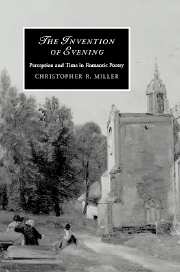Book contents
- Frontmatter
- Contents
- Acknowledgements
- Introduction
- 1 The pre-history of Romantic time
- 2 Coleridge's lyric “moment”
- 3 Wordsworth's evening voluntaries
- 4 Shelley's “woven hymns of night and day”
- 5 Keats and the “Luxury of twilight”
- 6 Later inventions
- Notes
- Bibliography
- Index
- CAMBRIDGE STUDIES IN ROMANTICISM
Introduction
Published online by Cambridge University Press: 04 May 2010
- Frontmatter
- Contents
- Acknowledgements
- Introduction
- 1 The pre-history of Romantic time
- 2 Coleridge's lyric “moment”
- 3 Wordsworth's evening voluntaries
- 4 Shelley's “woven hymns of night and day”
- 5 Keats and the “Luxury of twilight”
- 6 Later inventions
- Notes
- Bibliography
- Index
- CAMBRIDGE STUDIES IN ROMANTICISM
Summary
And now let us go out on the terrace, where “droops the milk-white peacock like a ghost,” while the evening star “washes the dusk with silver.” At twilight nature becomes a wonderfully suggestive effect, and is not without loveliness, though perhaps its chief use is to illustrate quotations from the poets.
Oscar Wilde, “The Decay of Lying” (891)Oscar Wilde's aesthetic manifesto is famous for its assertion that painters taught us to see sunsets and fog; but it is no less notable for its parting remark that poets gave us the language of twilight. The evening hour – no longer day and not yet night – has been the preeminent time of lyric utterance since the Romantic era, the period invoked when Wilde's alter ego Vivian quotes from Blake's sonnet “To the Evening Star.” An anthology of poems set at this threshold would include, to name only a few, Gray's “Elegy Written in a Country Churchyard,” Smith's Elegiac Sonnets, Shelley's “Adonais,” Whitman's “Crossing Brooklyn Ferry,” Eliot's “Love Song of J. Alfred Prufrock,” Stevens' “An Ordinary Evening in New Haven,” and Bishop's “At the Fishhouses.” If, as Wilde says, evening is useful primarily for illustrating the words of poets, it is remarkable that so many poets have found uses for this time of day, above all other times.
- Type
- Chapter
- Information
- The Invention of EveningPerception and Time in Romantic Poetry, pp. 1 - 13Publisher: Cambridge University PressPrint publication year: 2006



